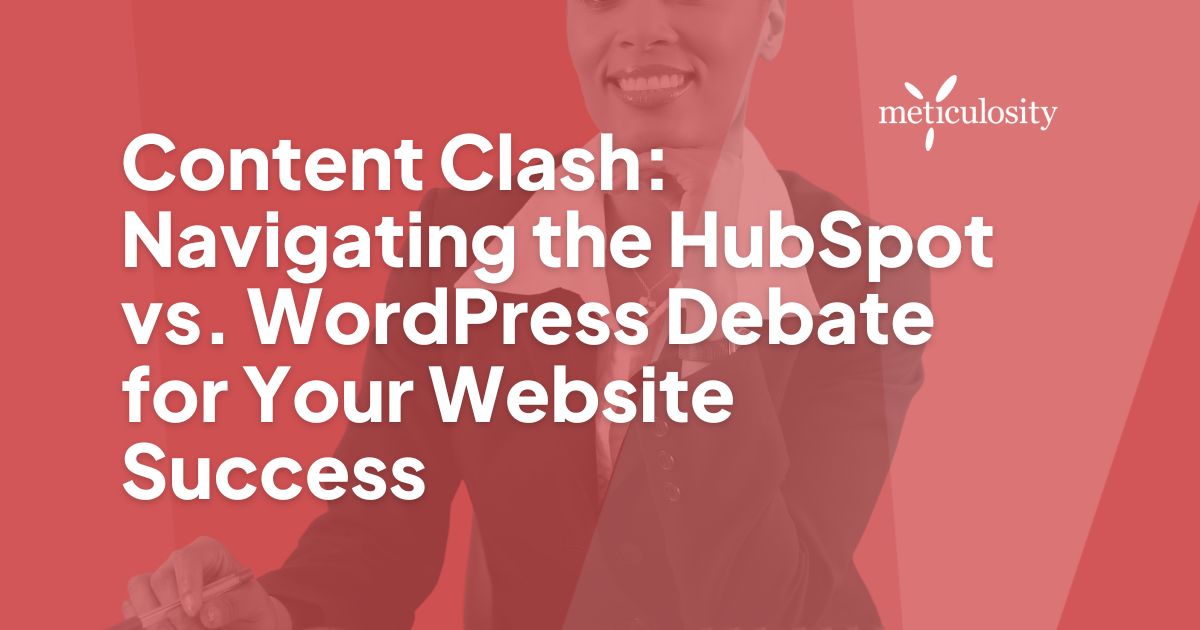Navigating the world of website creation can be more than a little overwhelming, especially when faced with options like HubSpot and WordPress.
In this blog, we're not just exploring each system's strengths and weaknesses; we're embarking on a journey together to help you make an empowered decision.
Key Takeaways
- HubSpot and WordPress are popular content management systems (CMS) used for building and managing websites.
- HubSpot offers integrated marketing and sales features, making it a comprehensive solution for businesses looking to streamline their online strategies. It has built-in tools for SEO optimization, content creation, email marketing, analytics, social media management, lead generation forms, and more.
- WordPress offers extensive customization options with thousands of themes and plugins available. It has plugin options for SEO optimization, ecommerce functionality with WooCommerce, contact form management with Contact Form 7, security features with Wordfence Security, and many others.
- Both platforms prioritize user-friendliness and provide support resources. HubSpot offers a drag-and-drop editor and strong support from their team as well as an active community. WordPress also provides a visual editor along with responsive customer support and an active forum community.
Understanding HubSpot and WordPress
HubSpot and WordPress are popular content management systems (CMS) used for building and managing websites, but they have key differences that make each unique.
What are they?
HubSpot is a tool for marketing. It helps with emails, social media, websites, and more. WordPress is a place to make a website or blog. You can pick themes and add extra tools to it.
Key differences
Let's look at the main points that set HubSpot and WordPress apart.
- Hosting: HubSpot gives you a free hosting place. WordPress makes you find your own.
- Ease of Use: HubSpot is easy for a beginner. WordPress needs more skill.
- Built-in Tools: HubSpot has SEO, content creation, and email tools built in. WordPress uses plugins for these tasks.
- Cost: WordPress can be less money to start with. HubSpot costs more but gives more tools.
- Customization: WordPress lets you change a lot about your site's look. HubSpot's design options are fewer.
- Support: HubSpot gives hands-on help to users. WordPress leans on an extensive community for support.
- Analytics: Both have this tool, but HubSpot's version is more detailed.
- Scalability: You can use both systems as your business grows, but in different ways.
Pros and Cons of HubSpot
HubSpot offers a wide range of marketing and sales features, making it a comprehensive solution for businesses looking to streamline their online strategies.
Marketing and sales features
HubSpot shines in marketing and sales tools. It has everything built in. You get SEO tips as you type your blogs and webpage copy. There's an email tool for sending newsletters to customers, too.
WordPress needs plugins for these tasks. This could mean learning new systems or paying extra fees. So, HubSpot wins for ease of use in marketing and sales features!
User-friendliness
Regarding user-friendliness, both HubSpot and WordPress offer intuitive interfaces that make it easy for marketers and business professionals to manage their websites. HubSpot provides a user-friendly platform with drag-and-drop functionality, allowing users to create and edit pages without coding skills easily.
WordPress also offers a user-friendly interface with a straightforward dashboard that allows for effortless navigation and content management. Both platforms prioritize ease of use, making it simple for users to update their websites and make changes without technical expertise.
Support and community resources for HubSpot
HubSpot provides excellent support and community resources to help you succeed. Their support team is always available to assist with any questions or issues you may have. They offer comprehensive documentation, tutorials, and training materials to help you learn and navigate the platform effectively.
Additionally, HubSpot has an active community of users who share their expertise and insights through forums and discussions. This supportive ecosystem allows you to connect with other marketers and business professionals who can offer guidance and inspiration for your HubSpot journey.
With HubSpot's strong support network, you can feel confident that help is readily available whenever needed.
Looking to optimize HubSpot for your business? Learn how to improve here.
Pros and Cons of WordPress
WordPress offers a wide range of plugin options for marketing and sales, allowing users to customize their website's functionality to meet their needs.
Plugin options for marketing and sales
When it comes to plugin options for marketing and sales, WordPress has an advantage over HubSpot. With its extensive library of plugins, you can easily find tools that cater specifically to your marketing and sales needs.
Whether it's for SEO optimization, lead generation, or email automation, there's a wide range of plugins available to enhance your website's capabilities. These plugins allow you to customize and expand the functionality of your WordPress site without much hassle.
On the other hand, while HubSpot offers integrated marketing and sales tools within its platform, the options may not be as extensive or customizable as those offered by WordPress plugins.
Customization options
Customization is an important aspect to consider when choosing between HubSpot and WordPress for your website. With HubSpot, you can access a range of themes and templates that can be customized to match your brand's look and feel.
You also can easily make changes to your website without coding knowledge. On the other hand, WordPress offers even more flexibility, with thousands of themes and plugins available for customization.
Whether you want to change the design or add new features, WordPress gives you the freedom to do so. Both options allow you to create a unique website tailored to your business needs.
Support and community resources for WordPress
WordPress offers a wide range of support and community resources to help you succeed with your website. If you ever run into any issues or have questions, you can contact their support team for assistance.
They are responsive and knowledgeable, ensuring that you get the help you need promptly. Additionally, WordPress has a vibrant community with active forums where users share tips, tricks, and solutions to common problems.
This means that someone is always available to lend a helping hand or provide guidance. Whether it's troubleshooting technical issues or getting advice on design and functionality, WordPress has ample resources to support you every step of the way.
Marketing and Sales Features
Discover how HubSpot's integrated tools and WordPress's extensive plugin options can supercharge your marketing and sales efforts.
HubSpot's integrated tools
HubSpot provides a range of integrated tools that can benefit your marketing efforts. Here are some key tools to consider:
- Marketing Automation: HubSpot's automation features help you streamline your marketing campaigns and nurture leads through personalized emails, workflows, and lead scoring.
- SEO Optimization: With HubSpot, you can optimize your website for search engines using built-in SEO tools. You can easily manage meta tags and keywords and monitor your website's ranking performance.
- Content Management: HubSpot's content management system allows you to create and publish content seamlessly. It offers a user-friendly editor with options for customization, formatting, and media embedding.
- Analytics and Reporting: HubSpot provides comprehensive analytics to track the performance of your website and marketing campaigns. You can measure website traffic and conversion rates and identify areas for improvement.
- CRM Integration: HubSpot's CRM integrates seamlessly with its marketing tools, allowing for better lead tracking, customer segmentation, and personalized content delivery.
- Social Media Management: HubSpot enables you to schedule and publish social media posts directly from the platform. You can also monitor engagement metrics and track social media ROI.
- Lead Generation Forms: HubSpot's forms feature simplifies capturing leads on your website. You can create customized forms with ease and collect valuable data from prospects.
- Email Marketing: With HubSpot's email marketing capabilities, you can create targeted email campaigns, automate follow-ups, and track interactions to improve engagement rates.
- Sales Enablement Tools: HubSpot offers sales-focused features like deal tracking, task management, email templates, document sharing, and live chat integration to streamline sales processes.
- Integration Capabilities: HubSpot integrates with various third-party applications such as Salesforce, Shopify, Gmail, Slack, etc., offering enhanced functionality across multiple platforms.
WordPress's plugin options
WordPress offers a wide range of plugin options that can enhance your website's marketing and sales capabilities. Here are some key plugins to consider:
- Yoast SEO: This plugin helps optimize your website for search engines, improving your chances of ranking higher in search results.
- WooCommerce: If you're running an online store, WooCommerce is a popular plugin that adds e-commerce functionality to your WordPress site.
- Contact Form 7: This plugin allows you to easily create and manage multiple contact forms on your website, making it easier for visitors to contact you.
- Jetpack: Jetpack offers a suite of features like site stats, spam protection, social media sharing, and more, helping you improve the performance and security of your website.
- Akismet: This plugin helps protect your website from spam comments by filtering out unwanted content automatically.
- WP Super Cache: By creating static HTML files of your dynamic WordPress site, this plugin improves loading times and enhances user experience.
- MonsterInsights: With this plugin, you can easily integrate Google Analytics into your WordPress site, giving you valuable insights into visitor behavior and engagement.
- OptinMonster: OptinMonster enables you to create eye-catching pop-ups and opt-in forms to capture leads and grow your email list.
- Wordfence Security: As one of the most popular security plugins for WordPress, Wordfence protects your website from malware attacks, brute force attempts, and other security threats.
- UpdraftPlus: This plugin simplifies backing up and restoring your WordPress site, ensuring you don't lose valuable data in case of accidents or emergencies.
Ease of Use and Customization
HubSpot offers a user-friendly interface with intuitive design options, while WordPress provides extensive customization opportunities to create a unique website. Discover more about their ease of use and customization capabilities in this blog post!
User-friendly interface
When it comes to a user-friendly interface, both HubSpot and WordPress have their strengths. HubSpot offers a drag-and-drop editor that makes it easy for users to create and customize webpages without needing coding skills.
The intuitive dashboard allows for easy navigation and access to various marketing tools. On the other hand, WordPress also provides a user-friendly experience with its visual editor and customizable themes.
Whether you choose HubSpot or WordPress, you can be confident in their ability to provide an interface that is accessible and user-friendly for your website needs.
Availability of customization options
As a marketer or business professionals, we understand the importance of having customization options for your website. When it comes to HubSpot and WordPress, both CMS platforms offer different levels of customization. Here are some key points to consider:
- Themes and templates: Both HubSpot and WordPress provide many themes and templates. These can help you customize the look and feel of your website without needing coding skills.
- Design flexibility: WordPress offers more design flexibility compared to HubSpot. With WordPress, you can access thousands of plugins and page builders that customize every aspect of your site's design.
- Custom code: If you have coding skills or a developer on your team, WordPress allows you to add custom code snippets to enhance your site's functionality and appearance.
- Content modules: HubSpot provides pre-designed content modules that you can easily drag and drop onto your pages. This allows for quick customization without the need for coding knowledge.
- Integration capabilities: Both platforms offer integration capabilities with other tools and services. However, WordPress has a larger ecosystem of plugins that can seamlessly integrate with various third-party applications.
- Mobile responsiveness: HubSpot and WordPress offer mobile-responsive themes, ensuring your website looks great on any device.

Support and Community Resources
HubSpot's support team is available 24/7 to assist you with any questions or issues, while WordPress offers a vast community of forums where users can find answers and connect with others.
HubSpot's support team
HubSpot's support team is really helpful and knowledgeable. They provide quick responses and guide you through any issues or challenges you may be facing. Having their support is great because it gives you the confidence to use HubSpot effectively for your marketing efforts.
WordPress's community forums
WordPress's community forums are a valuable resource for users who need help or want to share their knowledge. It's a place to ask questions, get advice, and exchange ideas with other WordPress enthusiasts.
Whether you're facing technical issues or looking for tips on customizing your website, the community forums offer a wealth of information. You can find solutions to common problems, discover new plugins or themes, and connect with experts with WordPress experience.
Being part of this active community can significantly enhance your WordPress journey and help you make the most out of the platform.
Choosing the Right CMS
When it comes to choosing the right CMS for your website, there are several factors you need to consider. Evaluating your priorities, considering your business size and goals, and assessing your budget are all important steps in making an informed decision.
To learn more about navigating the HubSpot vs. WordPress debate for website success, keep reading!
Evaluating your priorities
As a marketer or business professional, it's important to evaluate your priorities when choosing between HubSpot and WordPress for your website. Here are some key factors to consider:
Marketing and Sales Needs:- Determine what marketing and sales features are crucial for your business.
- Consider if HubSpot's integrated tools provide the required automation, SEO, and analytics.
- Evaluate if WordPress's plugin options can effectively meet your marketing and sales needs.
- Assess how easy it is to navigate and use each platform.
- Consider if HubSpot's user-friendly interface suits your team's skills and abilities.
- Determine if WordPress's customization options are manageable without sacrificing ease of use.
- Explore the level of support available from HubSpot's dedicated support team.
- Consider the benefits of joining HubSpot's community resources, such as forums and knowledge bases.
- Evaluate WordPress's community forums for readily available assistance from other users.
- Assess the financial implications of using either HubSpot or WordPress.
- Consider if the costs associated with HubSpot align with your budget limitations.
- Evaluate if WordPress offers more affordable hosting options while still meeting your website goals.
- Determine how well each platform can accommodate future growth for your business.
- Consider if HubSpot provides the scalability you need as your marketing efforts expand.
- Evaluate if WordPress can handle increasing traffic and content demands without performance issues.
- Assess how important design customization is for your brand identity.
- Consider if HubSpot's themes and templates offer enough flexibility to achieve your desired look.
- Evaluate if WordPress's extensive range of themes allows easier customization to match your brand image.
- Determine the extent to which each platform can integrate with existing tools and software.
- Consider if HubSpot's seamless integration with other marketing tools aligns with your needs.
- Evaluate if WordPress's plugin options can successfully integrate with your preferred software solutions.
Considering your business size and goals
As a marketer or business professional, it's important to consider your company's size and goals when deciding between HubSpot and WordPress for your website. Here are some factors to keep in mind:
- Think about the size of your business: Are you a small start-up, a mid-sized company, or a large enterprise? Each CMS may offer different features and pricing options that align with your needs.
- Evaluate your goals: What are you hoping to achieve with your website? Do you primarily need robust marketing and sales tools, or is customization and design flexibility more important? Understanding your goals will help you prioritize which CMS is the best fit.
- Assess your budget: Consider what you can afford regarding upfront costs and ongoing expenses. HubSpot tends to be pricier but includes various integrated tools, while WordPress offers more affordability through its wide range of free or low-cost plugins.
- Look ahead: Think about scalability and long-term sustainability. Will your business grow rapidly over time? If so, a CMS like HubSpot might be better equipped to handle future expansion. If you prefer more control and flexibility over the long term, WordPress offers extensive customization options.
Assessing your budget
Now, let's talk about assessing your budget. When deciding between HubSpot and WordPress, it's important to consider the costs involved. As a business professional or marketer, you must consider how much you are willing to invest in your website.
Both HubSpot and WordPress offer different pricing plans, so it's essential to evaluate which one aligns with your budgetary constraints. Additionally, keep in mind that while WordPress itself is a free platform, you may need to spend money on hosting services, premium themes, and plugins for additional functionality.
On the other hand, HubSpot provides an all-in-one solution that includes hosting and various marketing tools but can be more expensive than WordPress. Ultimately, understanding your financial resources will help guide your decision-making as you choose the right CMS for your website's success.
Making the Decision
When deciding between HubSpot and WordPress, compare their features and costs while considering long-term sustainability.
Comparing features and costs
It's essential to weigh both platforms' features and costs before deciding. Let's look at the comparison between HubSpot and WordPress regarding features and costs.
|
Features/Costs |
HubSpot |
WordPress |
|
SEO Tools |
Standard in all plans |
Available through plugins, some free and others paid |
|
Email Marketing |
Included in most plans but limited in the free plan |
Requires paid plugins |
|
CRM |
Integrated and available even in a free plan |
Requires third-party integration |
|
Analytics |
Comprehensive analytics included |
Requires plugins, Google Analytics, most common and free |
|
Design Customization |
Highly customizable, but might need professional assistance |
Highly customizable, ranges from simple to advanced based on skills |
|
Upgrade Cost |
High, with plans ranging from $50 to $3,200 per month |
Low, as most costs are in themes and plugins |
By doing this, we can see that while HubSpot offers a more all-in-one package, WordPress allows for more customization and control at a potentially lower cost. It's up to you to decide which factors are most crucial for your business.
Considering long-term sustainability
When choosing a content management system (CMS) for your website, it's important to consider its long-term sustainability. This means thinking about the platform's ability to adapt to future changes and trends in the digital landscape.
Both HubSpot and WordPress have their strengths in this regard. HubSpot is known for its continuous updates and innovative features that keep up with industry advancements. On the other hand, WordPress has a large and active community of developers who constantly create new themes, plugins, and updates to ensure the platform remains relevant.
By evaluating your priorities, business size, goals, and budget and comparing features and costs between HubSpot and WordPress, you can decide which CMS will provide the long-term sustainability your website needs for success.

Conclusion
In conclusion, choosing between HubSpot and WordPress for your website success depends on your specific needs. HubSpot offers integrated marketing and sales features, a user-friendly interface, and substantial support resources.
On the other hand, WordPress provides a wide range of plugin options and customization capabilities along with an active community. Consider evaluating your priorities, business goals, and budget to make the right decision that aligns with your requirements.
Click here to learn more about HubSpot marketing.
FAQs
1. What is the main difference between HubSpot and WordPress, and how do I choose between them for my website?
HubSpot and WordPress serve different purposes in the digital landscape. WordPress is a content management system (CMS) that offers flexibility and customization for website creation, blogging, and a wide range of plugins. HubSpot, on the other hand, is an all-in-one platform that combines marketing, sales, and customer service tools with a CMS. The choice between them depends on your business needs – if you prioritize a unified platform with integrated marketing tools, HubSpot might be suitable. If you prefer flexibility and a large ecosystem of plugins, WordPress might be the choice.
2. Which platform is more suitable for SEO, HubSpot or WordPress?
-
WordPress: WordPress is renowned for its SEO capabilities, offering a plethora of plugins like Yoast SEO that provide extensive tools for optimizing content, meta tags, and more. Its open-source nature allows for deep customization and control over SEO settings.
-
HubSpot: HubSpot also prioritizes SEO with built-in tools, allowing users to optimize content, manage meta descriptions, and analyze SEO performance. HubSpot's platform emphasizes an integrated content, SEO, and analytics approach.
Both platforms can support robust SEO strategies, and the choice may depend on your specific preferences, existing tools, and the level of integration you seek.
3. How do HubSpot and WordPress differ in user-friendliness and ease of use?
-
WordPress: Known for its user-friendly interface, WordPress is intuitive and widely used. It's accessible to beginners and offers a vast community and resources for learning.
-
HubSpot: HubSpot provides a user-friendly experience, especially for users already familiar with its suite of tools. The integrated nature of HubSpot means that users can manage marketing, sales, and service activities from a centralized dashboard.
The ease of use depends on your familiarity with each platform and specific needs. While WordPress is more versatile, HubSpot's unified platform simplifies management for those seeking an all-in-one solution.
4. Can I integrate third-party tools with HubSpot and WordPress?
-
WordPress: WordPress has a vast ecosystem of plugins, making it highly integrative. You can connect with various third-party tools and services to enhance functionality, from ecommerce plugins to analytics and social media integrations.
-
HubSpot: HubSpot also supports integrations through its App Marketplace, allowing users to connect with various third-party tools for CRM, email marketing, analytics, and more.
Both platforms offer integration capabilities, but the ease and range of integrations may vary. Consider your specific tool requirements and check the availability of integrations for each platform.







